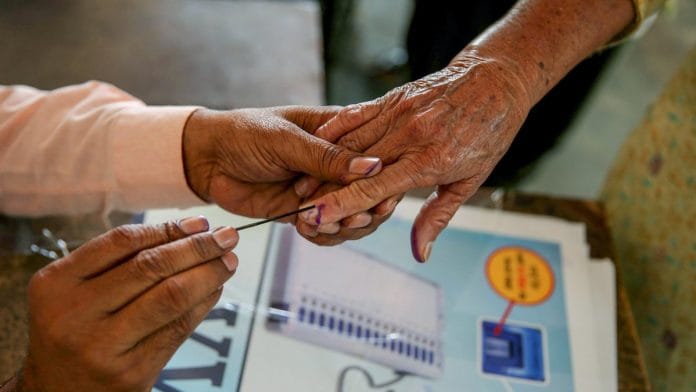The journey is as important as the destination, as the saying goes. This rings true as the election season in India draws to a close after a nail-biting finish, though leaving room for some more twists and turns, perhaps in sync with a coalition era. Some called the counting of votes for the 18th Lok Sabha elections a “national thriller”, while others used terms like “down to the wire contest”. While the result came as a surprise, going back to reporters’ diaries, looking at newspaper reports from the last 45 days, and exchanging notes with colleagues who travelled to different parts of the country during polling helped connect the dots. Of course, some things still don’t add up.
In Gujarat, where the Bharatiya Janata Party (BJP) had scored 26 out of 26 in 2014 and 2019, there was a setback in 2024 with a Congress candidate winning the Banaskantha seat. A rural district focused on dairy farming, Banaskantha was won by Geniben Nagaji Thakor, a woman candidate, who defeated BJP’s Rekhaben Chaudhary, also a woman. Our ground reporting from across many constituencies of Gujarat had suggested unemployment, rising prices, and high taxes were among the concerns of the people, like in other parts of the country, besides local caste-based issues linked to Kshatriyas and Rajputs. In fact, the Kshatriya agitation, which was central in Rajkot and other Saurashtra regions, found expression even in north Gujarat’s Banaskantha and Patan, where the community has a good presence.
Closer to the election, there was a buzz in Gujarat — a stronghold for the BJP— that the ruling party might lose a couple of seats in the state mainly over local and hyperlocal issues, such as those revolving around the Kshatriyas, Patedars and Patels. That message may have been lost in the big picture electoral battle.
What did not add up, however, in the Gujarat piece is the clean sweep of BJP in the main Saurashtra regions where Union minister Parshottam Rupala attracted the Kshtariya ire for making unsavoury comments about Rajputs. Mr Rupala, who had tendered a public apology for his comments, had told us on the eve of the Gujarat election that the Kshatriya issue would not affect the election result. As the results showed on Tuesday, he won by a wide margin.
In Uttar Pradesh, which delivered a major upset for BJP, severe rural distress was a dominant theme during election reporting. The political narrative around Ayodhya temple did not help those struggling to meet their daily needs. In Faizabad, commonly referred to as the Ram Temple seat, BJP lost to Samajwadi Party in what seemed like a shocker. Irrespective of the religious sentiment around the inauguration of the shrine, economic issues appeared to have played a role in Faizabad and other seats in the Ayodhya division.
A conversation with locals familiar with the changing scene in the town of Ayodhya, as narrated by another reporter, offers a glimpse into the unrest among the people there. Locals attribute the Faizabad election reverse to Ayodhya being converted into a touristy town, as part of the global map, with things becoming expensive and beyond reach for the poor. The disruption caused in the temple town as commercial real estate boomed is believed to have adversely impacted the locals, even as the process may have created employment.
In the case of Mumbai, the BJP won only one seat—Piyush Goyal from North Mumbai. Other five constituencies in the city went to other parties. These constituencies, including Mumbai North Central and Mumbai South, along with three others, have voters from Bollywood and Corporate India as well as small and medium enterprises. Were they thinking of issues like low consumption demand and lacklustre investment by businesses, as our Maharashtra coverage hinted at? Or was there something else?
In some other parts of India, mainly the north, micro, small and medium enterprises are still talking about the stress caused by big currencies being taken out of the system, the impact of the goods and services tax, and also Covid-19. In Punjab specifically, the need for manufacturing units and stringent rules of the National Green Tribunal (NGT) are cited as hurdles for businesses.
While Delhi voters we spoke to voiced similar economic concerns, it was a BJP sweep across all seven seats. This is despite Delhi Chief Minister Arvind Kejriwal doing all-out campaigning after being out on bail for a few weeks. While the vote share of the Congress and the Aam Aadmi Party rose, it did not translate into seats.
The train journeys with which we started our election coverage, tracking the mood of the passengers from the extreme north to the south, captured many of the economic worries related to jobs and labour issues that constituencies threw up during the seven phases of the election.
So, was this election more about basic economic issues and not so much about politics? At least, the election journey captured a story around life and livelihood, while the jury may still be out on the rest.
Nivedita Mookerji @nivmook is the Executive Editor of Business Standard. Views are personal.






